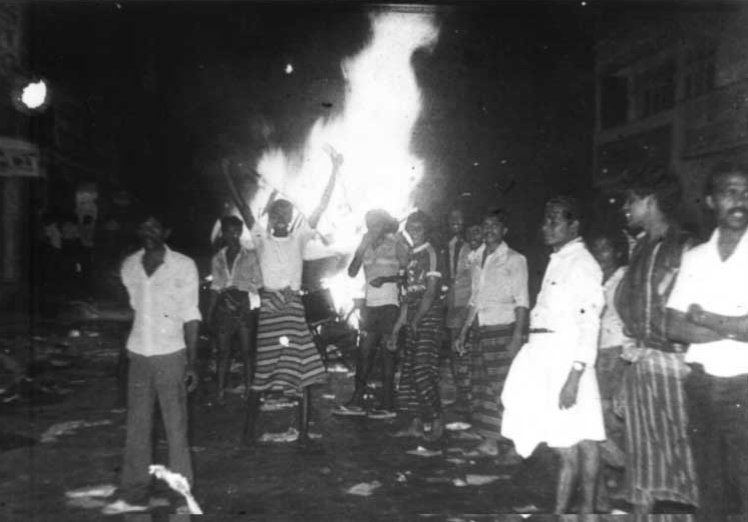![]()
Responding to a question on Maaveerar Naal, Jaffna MP C V Wigneswaran accused Sri Lanka of committing "state terrorism" and maintained that "our youth were compelled to take up arms for the self-defense of our people".
Reflecting on the question of terrorism, Wigneswaran said that Sri Lankan "state terrorism begot victim violence". "You cannot conduct continuous pogroms against a community and expect them to accept all humiliation and violence and go about their day to day chores as if nothing has happened," he added.
Wigneswaran further highlights the ethnic composition of Sri Lanka’s military, stating that it is “almost 99 per cent Sinhalese”. It is this Sinhala military, Wigneswaran notes, that attack the deceased, calling “our dead as Terrorists and Separatists”. "None of them were terrorists," he maintained.
State terrorism

Sinhala rioters celebrate as they pause in the destruction of homes and businesses in Tamil sectors of Colombo
He goes on to question the narrative of the state emphasizing the history of anti-Tamil pogroms since independence, “in 1958, 1961, 1977, 1983, and so on”. During these pogroms;
“Men were stabbed to death, women were raped and killed, children were cut, chopped and killed, many innocents were put into cars and set fire to. Houses of Tamils were set fire to, simply because they were Tamils. For no other reason! All this was done while the government of the time got its Police and Military to look the other side! It was State terrorism at work!”
“Is remembering one’s dead a heinous crime?”
This, Wigneswaran notes, was the question asked by former Sri Lankan President, and war criminal, Chandrika. She was reflecting on the brutality with which the Sri Lankan State crushed the JVP insurrection, killing tens of thousands. “The Sinhala youth of today should understand all this” Wigneswaran added. “When it suits the powers that be, they name anyone Terrorist and anything he or she does even legitimately as Terrorist activities”.
Quoting Dr N.M. Perera, Wigneswaran reflects on the nature of democracy noting that it is not simply “counting heads” but rather “an adjustment of different points of view […] giving full weight to the rights of minority communities”.
Addressing concerns that Maaveerar Naal could ignite further violence, Wigneswaran maintains that it is not of the will of the people to return to violence but rather that “government’s actions seem to be aimed at getting our people back into violence”.
He warns that it is the responsibility of government, not to propagate violence but rather to ensure that is a just resolution.
“Conflict resolution theories state that denying human rights and unleashing vicious repression can lead to violence. When you press a rubber ball under the water at some time or the other it would jerk up to the surface. You cannot continue to keep a community of people and for that the Tamils who are the inheritors of a five thousand or over years’ civilization and heritage, forever under shackles”.
Sri Lanka and the International Community
The 1983 riots were a watershed moment for the international community, Wigneswaran notes. One in which “Sri Lanka had become a dirty word the world over”. The butchering of innocent Tamils continued under the pretext of war.
In the North East, Wigneswaran notes, that bloodbaths were led not by rioters but by the military. He warns that “any attempt to precipitate a blood bath in the North or East will drive the World community to make Balkanisation a reality in Sri Lanka”.
Read his full statement here.
